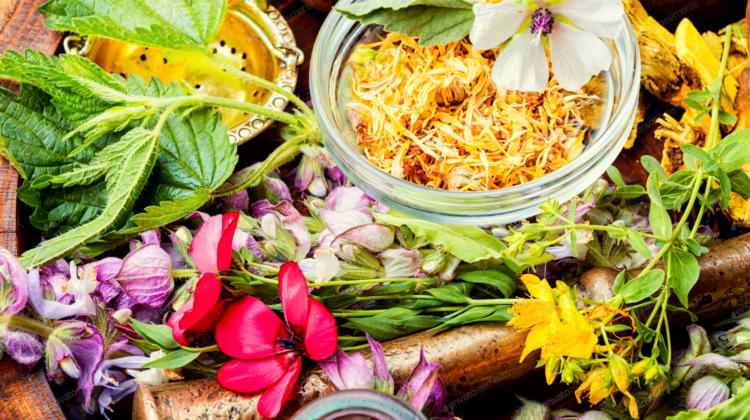
Photo Credit: twenty20photos
For centuries, humans have used herbs as a way to heal or alleviate a wide variety of ailments. Today, many of these plant-based remedies can be easily found in the bulk herb or supplement aisle of a grocery store.
These herbs come in a multitude of forms in order to give people the best healing experience possible. Some of these include dried herbs, topicals (lotions and oils), teas, and infusions. When paired with cannabis, certain herbs can enhance the healing properties of the plant.
Below are five herbs that may relieve various ailments and can also be used with cannabis for optimal healing effects.
Lavender

Known for its aromatic purple flowers, Lavender can relieve pain, anxiety, depression, and insomnia.
Lavender can help alleviate various types of pain. For example, research has supported that lavender essential oil can help reduce headache pain. Additionally, it may also reduce other types of pain. In an Annals of Medical and Health Sciences Research study, women who smelled lavender for 30 minutes per day during the first three days of their period had less menstrual pain after two months.
A large 2019 meta-analysis of people with anxiety disorders found significant decreases in anxiety in people after they took 160-mg lavender oil capsules.
While Lavender’s effects on depression aren’t as well documented as those on anxiety, research has shown promising results. For example, a small 2015 study that looked at people with kidney disease examined patients who inhaled a lavender scent for 1 hour during hemodialysis. The researchers found that people who inhaled lavender had lower scores of depression and stress than those who did not.
Further, research suggests that lavender can improve the body’s melatonin levels, helping support restful sleep.
Lavender and cannabis both contain the terpene linalool, which has anti-inflammatory properties according to studies. Research finds that when combined with THC — the psychoactive component in cannabis — linalool can act as a potential muscle relaxant.
Rose

Like Lavender, rose has been associated with helping both anxiety and depression. For instance, research shows that rose tea’s aroma may reduce stress and anxiety, according to WebMD.
But the aromatic plant may also contain a host of other benefits. Rose petals contain polyphenols, which are antioxidants that protect the body from cell damage. The polyphenols in rose tea reduce the risk of heart disease, diabetes, obesity, and cognitive diseases, as reported by WebMD.
People have used rose tea to treat stomach issues. Research suggests that rose tea has the ability to increase bile production in the liver. This allows the body to digest food easier, prevent constipation and potentially improve nutrient absorption.
In recent years, people have used rose’s malleable petals as a way to make tobacco-free blunt wraps. According to Leafly, when paired with cannabis, rose has calming and very peaceful effects, acting as a mood booster. When smoked, rose produces a sweet floral scent.
Mullein

Having a similar aroma to black tea, people have smoked mullein for centuries for its relaxing respiratory properties. The herb can treat inflamed lungs and coughing.
Similar to rose, mullein has polyphenols, which also have anti-inflammatory qualities that help ease congestion. The herb also is reported to have sedative and diuretic effects.
Mullein also has antiviral and antibacterial properties. Specifically, lab studies have shown the Verbascum species of mullein has antiviral activity against influenza A and herpes. Additional studies discovered that the herb has antibacterial properties in Gram-positive and Gram-negative bacteria, including Klebsiella pneumoniae, E. coli, Staphylococcus aureus, and more.
When paired with cannabis, the herb can help ease coughing, as reported by Leafly.
Mugwort

Mugwort can treat a wide variety of conditions. According to WebMD, “people use mugwort for stomach and intestinal conditions, irregular periods, lack of energy, scarring, and other conditions, but there is no good scientific evidence to support these uses.”
However, many find the herb helpful for sleeping, promoting peacefulness, and enhancing the effects of dreaming, according to the CommonWealth Center for Holistic Herbalism. Mugwort may also help with remembering dreams and might even help induce lucid dreaming.
With its sage-like flavor, mugwort pairs well with cannabis strains high in linalool. Due to the herb’s effect on dreams, this makes it a good herb to combine with cannabis for sleep, as Leafly reports.
Damiana

Damiana is an herb that has been used traditionally as an aphrodisiac since ancient Aztec and Mayan times. Traditionally, people have also used it to treat bladder and urinary issues, Healthline explained.
The herb also has soothing, relaxing effects on the body and mind. Further, Damiana reportedly helps enhance sexual health and treat diabetes and anxiety. However, there is mostly anecdotal evidence to support these effects.
Delivering a smooth smoke when paired with cannabis, Damiana has relaxing effects that release tension. Leafly suggests that Damiana is best suited with indica strains or those high in pinene, the piney terpene.
On their own, herbs can have many helpful medical healing purposes, and combining them with cannabis can enhance their healing effects.


Thanks
Awesome and FINALLY the polyculture'”salad bar” approach We the Patients hope for and YEAH and thank you We can wrap our prerolls in MULLEIN LEAF because both cannabis and mullein leaf are bronchodilators and improve lung health
We can wrap our prerolls in MULLEIN LEAF because both cannabis and mullein leaf are bronchodilators and improve lung health  Also heard that we can roll our prerolls in rose leaves, too
Also heard that we can roll our prerolls in rose leaves, too  Lavender is wonderful, too
Lavender is wonderful, too  We the Patients hope for more POLYCULTURE approaches like this and thank you
We the Patients hope for more POLYCULTURE approaches like this and thank you 
I’d like to add Lobelia Inflata, AKA Indian Tobacco, to the list. Native Americans smoked this to relieve asthma and lift depression, and it mixes well with cannabis. It works, too. One caveat: It’s also an emetic if you use a lot– that’s why it has the unfortunate nickname of Pukeweed…